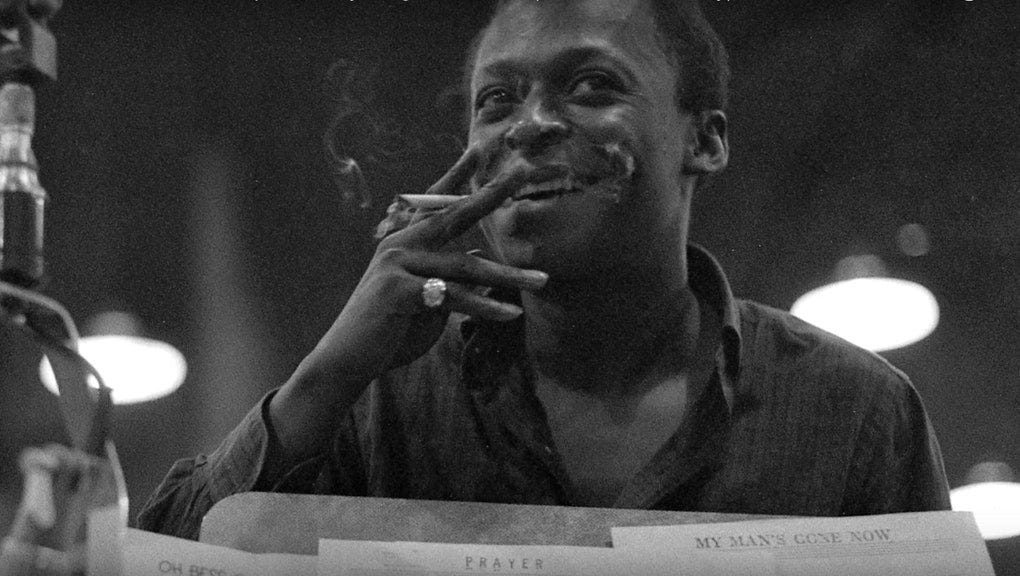Betty Carter, one of the best vocalists of all time, and Miles Davis, one of the best of all time at sounding like himself, which is one of the greatest and most expansive and terrifyingly sorrowful and soulful sounds of all time, shared a mostly undocumented but very deep friendship. They met in Detroit, Betty’s hometown, when Miles visited on tour and she sat in with the band, and were fast friends.
Later, they lived at the same New York hotel apartment complex, Betty lived there solo, and Miles with his family, which at the time included a wife and three children. Carter became one of his trusted confidants, on the level of Gil Evans, interestingly both Carter and Evans were born under the sign of Taurus, known for fierce sensuality and fierce loyalty among other characteristics. The cadence of a good a friendship is mutual listening and Betty listens like a genius, you can hear her listening even as she sings a thirty second chartreuse hued note, she’s listening to its arch and knows when to shift into its next phase or a recognizable phrase after a hiatus filled with scatting and wordless vocals.
Miles took an abrupt improvised hiatus from his New York routine, he disappeared, left his family in that hotel apartment, and sent word that he wanted Betty Carter to look after his family for him, and Betty did. She took them in, and ultimately moved them to Brooklyn with her and helped them transition into a life without Miles as the marriage between him and his wife ended. You can hear in Betty’s recountment no shrill judgement or resentment for the favor or sudden duty Miles handed her, just matter-of-fact retelling— this is what happened, this is what happened between me and my friend Miles, who I love. The clearest acts of love are defenseless, need no adjectives or hype to prove themselves, and here was Betty Carter, yet again, embodying love itself and demanding nothing in return.
Reciprocity came, however, when Miles was invited to perform at Washington D.C.’s Howard Theatre, and he hired Betty to join him, after having the theater fire the assigned singer, which led to Betty being signed by Miles’s agent and meeting Ray Charles, who also had the same agent. Betty went on to record one of her most well known songs, Baby it’s Cold Outside, with Ray. This is where I pivot to reverie and wonder about Miles and Betty meeting my father, who worked very closely with Ray Charles for years. Those are stories I’d have to dig up through inquiry but the focused digging chips away at the scar tissue of aimless wonder and our family expands. Not just my blood-linked family, but the infinite black griot family, the family Mos Def is addressing when he asks on a track we’re gonna get it together, aren’t we? I really believe that.
Friendships built on the private culture of black music have a sacred and unspeakably telepathic air about them. In my experience that air is made up of the quiet knowing of what we go through to make anything called or called forth by, music. It’s not just friendship for company or to pass the time or do activities, it’s fellowship with fellow soldiers, partners in the war that, if we win, will allow us simply to sound exactly like who we are, forever, undistorted by fanfare and radio and sales and shows and gossip and hype and hiatus, enhanced by every so-called struggle, glowing like shared eyes looking out by the time the stage lights dim, a heap of the gold grinning teeth of the music stacked as unread love notes in the woodshed, that friendship. A digression, because such friendships are digression from the hardship that is public misidentification, that so many well-known musicians endure to be known. True artistic friendship is a place where people who are named outside of their names all the time can simply be themselves. Trouble comes in because to be oneself honestly sometimes means to abandon anything that constricts or lies to the self, sometimes even the haven of familiarity that keeps us near our closest friends, the ones who feel like home.
Nowhere in her telling of the feeling of knowing and loving Miles, does Betty Carter complain, as is the vogue today, of emotional labor, or make any mumbled remark about him being irresponsible or a bad husband or father. She reminds us of where he excelled and exceeded this world instead. She doesn’t entertain the disapproval of his manhood she knows will come from some judgmental listeners, she promises he was exactly who he was and gave her the space to be that for herself, made her more like herself in being himself. She named one of her own sons Myles in tribute, in echo, to these actualized selves becoming one in quiet ways. When you find romance that requires no rhetoric or tally, you will always find music near it, in this case, two of the best musicians who ever lived, deep in healing platonic love, and Betty promising finally, I probably know why Miles did everything he did, and I’m not telling you.





